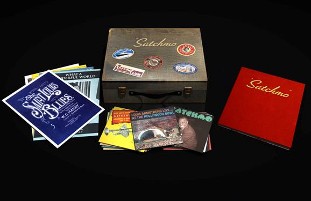Satchmo: Louis Armstrong, the Ambassador of Jazz, out on August 9 from Universal, is an elaborately packaged box set that contains seven CDs’ worth of classic Armstrong recordings, three bonus discs, a two-hundred-page hardcover book, and various other souvenir-type items. According to Russ Titelman, the producer, Satchmo purports to be “the definitive version of the Armstrong legacy.” This is, of course, nonsense. Still, it’s certainly possible, at least in theory, to convey a reasonably complete sense of what Armstrong was all about within the compass of a seven-disc set.
 Does Satchmo get the job done? I haven’t seen it yet, and nobody at Universal asked for my advice, but I have seen a complete track listing, and I can tell you that of the thirty “key recordings by Louis Armstrong” listed in the appendix to Pops: A Life of Louis Armstrong, twenty-seven will be included on Satchmo. That’s a damned good batting average–which figures, since Armstrong scholar–blogger Ricky Riccardi was mainly responsible for selecting the tracks.
Does Satchmo get the job done? I haven’t seen it yet, and nobody at Universal asked for my advice, but I have seen a complete track listing, and I can tell you that of the thirty “key recordings by Louis Armstrong” listed in the appendix to Pops: A Life of Louis Armstrong, twenty-seven will be included on Satchmo. That’s a damned good batting average–which figures, since Armstrong scholar–blogger Ricky Riccardi was mainly responsible for selecting the tracks.
For me, the only jaw-dropping omission was “Beau Koo Jack,” though it’s certainly not one of Armstrong’s most famous recordings, nor is it included in my appendix. In addition, there’s nothing from the justly celebrated album that Armstrong made with Duke Ellington in 1962. (Alas, Universal doesn’t control the rights to that album.) Otherwise, virtually all of the really important sides are present and accounted for, and plenty more besides.
I don’t know who’s going to buy Satchmo, nor do I think there’s much point in purchasing such a megadeluxe package when you can acquire all of Armstrong’s greatest recordings separately at very reasonable prices (or download them from iTunes). Still, my preliminary impression is that if you’re interested, this set appears to be an excellent piece of work.
* * *
Here’s a promotional video for Satchmo, which includes a tour of the Louis Armstrong House Museum in Queens. It’s worth watching:
Archives for July 18, 2011
TT: Almanac
“All of us–the public, critics, and composers themselves–spend far too much time worrying about whether a work is a shattering masterpiece. Let us not be so self-conscious. Maybe in thirty years’ time very few works that are well known today will still be played, but does that matter so much? Surely out of the works that are written some good will come, even if it is not now; and these will lead on to people who are better than ourselves.”
Benjamin Britten, interviewed by Edmund Tracey (Sadler’s Wells Magazine, Autumn 1966)
